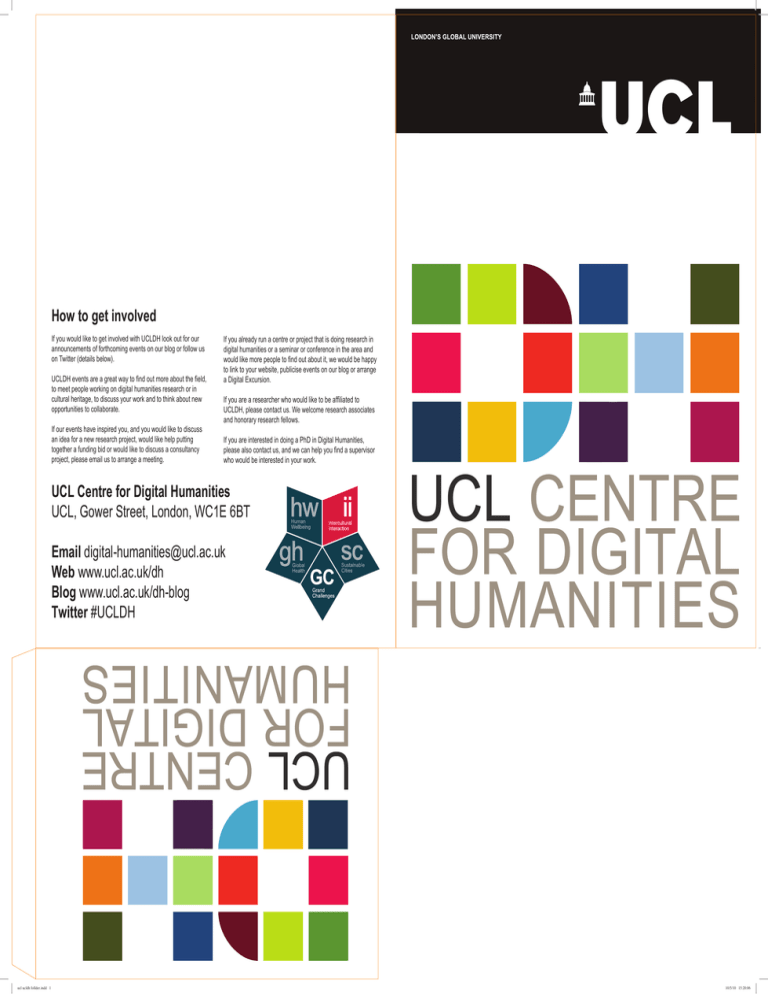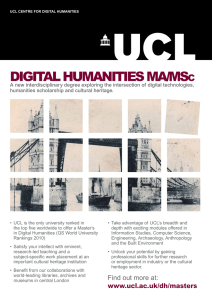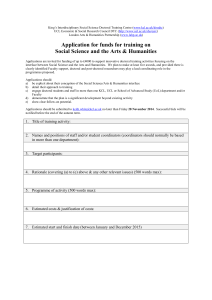How to get involved
advertisement

How to get involved If you would like to get involved with UCLDH look out for our announcements of forthcoming events on our blog or follow us on Twitter (details below). UCLDH events are a great way to find out more about the field, to meet people working on digital humanities research or in cultural heritage, to discuss your work and to think about new opportunities to collaborate. If our events have inspired you, and you would like to discuss an idea for a new research project, would like help putting together a funding bid or would like to discuss a consultancy project, please email us to arrange a meeting. If you already run a centre or project that is doing research in digital humanities or a seminar or conference in the area and would like more people to find out about it, we would be happy to link to your website, publicise events on our blog or arrange a Digital Excursion. If you are a researcher who would like to be affiliated to UCLDH, please contact us. We welcome research associates and honorary research fellows. If you are interested in doing a PhD in Digital Humanities, please also contact us, and we can help you find a supervisor who would be interested in your work. UCL Centre for Digital Humanities UCL, Gower Street, London, WC1E 6BT Email digital-humanities@ucl.ac.uk Web www.ucl.ac.uk/dh Blog www.ucl.ac.uk/dh-blog Twitter #UCLDH ucl ucldh follder.indd 1 10/5/10 15:20:06 What is digital humanities? Digital humanities studies the intersection of digital technologies and computational techniques with humanities and cultural heritage. Its objects of study include primary and secondary source material, such as texts, images, film, sound, performance and objects in 2D or 3D. These may come from museums, galleries, archaeological digs or other memory institutions. Digital humanities involves the creation of digital artefacts, models, collections, software, systems and interfaces, or research on those who use such resources. It is also concerned with the ways in which digital data and objects may be retrieved, organised, collected, curated and preserved for future use. It aims to produce computational applications and models which make possible new kinds of knowledge both in humanities disciplines and in computer science and its allied technologies. It also studies the impact of these new techniques on cultural heritage, memory institutions, libraries, archives and digital culture. Some questions for digital humanities research The following are some of the questions we might ask in digital humanities research, although these are by no means the only ones possible in this diverse discipline: • What new tools, applications and models can be created to facilitate new ways of interacting with humanities resources, and why have so many previous tools failed to be adopted? • How should digital resources be created and organised so as to be most easily interrogated? • How should digital objects be managed and preserved so as to ensure effective access and use? • What kind of use is made of digital resources? What do their users need? Can we encourage re-use once they are created? • What financial models and practices can support the creation and maintenance of such resources, so as to ensure long-term sustainability? • How can we apply and refine emergent techniques such as 3D scanning and modelling, large-scale data mining or grid computing to research in the humanities? • How do physical and digital objects relate to each other and enrich the user-experience of libraries, museums, digital art or literature? Digital humanities at UCL The UCL Centre for Digital Humanities (UCLDH) is the hub of a network, bringing together work being done in different departments and research centres within UCL. It also works closely with UCL Library Services, UCL Museums & Collections and UCL Research Computing. This allows us to benefit from facilities and artefacts ranging from rare books, original artwork and museum objects to high-performance computing and 3D scanning. UCLDH is also creating connections beyond UCL, working with major archives, galleries, libraries, museums and members of the public to undertake research that looks at the numerous questions raised in this diverse field. UCLDH is funded by UCL as part of the Provost’s Strategic Development Fund and its work is relevant to the UCL Grand Challenges of Intercultural Interaction and Human Wellbeing. What we do Research We undertake research and supervise PhD students working on a wide variety of topics in digital humanities. We provide advice on developing new digital humanities projects, and on applications for funding them. Events We organise a variety of events, designed to allow researchers to meet others doing interesting work in digital humanities, both within and beyond UCL: • Digital Excursions – an opportunity to visit different parts of UCL and cultural heritage organisations to find out about digital humanities research and the facilities and equipment available • Painless Introductions – a series of brief seminars designed to introduce researchers to basic concepts and techniques in digital humanities, and the logistics of preparing funding bids for projects • Decoding Digital Humanities – an informal discussion group about all things relating to digital humanities • workshops, seminars and meetings – individual events covering areas such as digital sustainability and the future of reading. Engagement with digital humanities beyond UCL We co-sponsor external digital humanities research forums, for example Digital Classicist and the London Seminar in Digital Text & Scholarship. We collaborate with cultural heritage organisations beyond UCL, such as the British Museum and the British Library, by organising workshops, speaking at events and fostering new research collaborations. Cert no. SGS-COC-004224 ucl ucldh follder.indd 2 10/5/10 15:20:11




